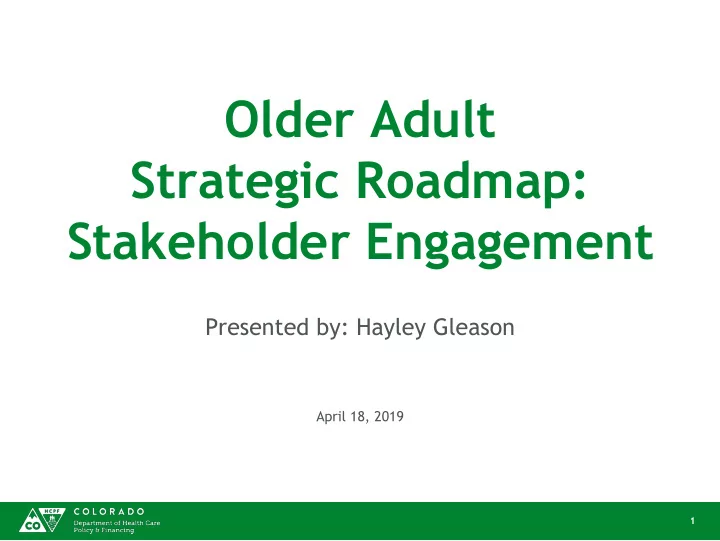

Older Adult Strategic Roadmap: Stakeholder Engagement Presented by: Hayley Gleason April 18, 2019 1
Our Mission Improving health care access and outcomes for the people we serve while demonstrating sound stewardship of financial resources 2
Overview of Older Adult Strategic Plan Development Engage with Stakeholders Seek input about challenges, ideas, and recommendations for inclusion Review Best Practices and Models Evidence-based programs and innovative models from other states Consult with Experts to Prioritize Finalize 5-Year Plan and Stakeholder Engagement Strategy 3
Stakeholder Engagement State-Level Stakeholders Seven focus groups held in Denver in February and March 2019 Colorado Senior Lobby Strategic Action Planning Group on Aging Colorado Commission on Aging Colorado Gerontological Society Funders and Academics (representatives from COCare and the Aging Dialogue Groups) State Department Representatives HCPF Representatives 4
Stakeholder Engagement Community-Level Stakeholders Ten listening sessions held regionally in March and April 2019 Five sessions with older adults and family members, five with stakeholders and providers El Paso County Weld County Boulder County Otero County Montrose and Delta Counties 5
Stakeholder Engagement Community-Based Organizations and Counties Mini-listening Sessions with Two Key Older Adult focused organizational representatives in April 2019 Options for Long Term Care Association- Single Entry Point Representatives Colorado Association of Area Agencies on Aging (C4A)- Area Agencies on Aging Executive Directors ALL STAKEHOLDER ENGAGEMENT Feedback Collected from Approximately 250 Stakeholders 6
Stakeholder Feedback: Challenges & Barriers Themes Social Determinants of Health Personal Finances & Planning Communication Ease of Access Transitions in Care and Care Coordination Provider Capacity 7
Social Determinants of Health • Housing – including availability, • Geography - Unique challenges accessibility, affordability • Ageism and other -isms • Social isolation • Lack of age-friendly communities (walkability, • Food insecurity & poor nutrition accessible, building code • Vulnerable populations- Safety limitations) concerns • Limited employment • Transportation - for medical opportunities needs and life engagement • Family supports - Caregivers needs • Culturally appropriate interventions 8
Personal Finances & Planning • Health and financial literacy • Individuals who ‘fall through the cracks’ - Do not qualify for • Lifespan, living longer- Did not Medicaid but can not afford their plan financially medical and long-term care • Death of spouse can lead to needs economic hardship • Wealth = health • Challenges with paying for long- • Income eligibility weighted term care needs toward destitute • Loss of income for informal caregivers • Financial exploitation 9
Communication Community-Level - Individuals do not know where to go, lack of individual advocacy (older adults not identifying as ‘seniors’), can be a disconnect between resources and the individual’s needs and location Agency-Level - Agencies locally not talking with one another, lack of awareness about what other resources exist State-Department level - Silos exist, can be a lack of stakeholder input into policy development and decisions 10
Access • Lack of info on resources or how • Access to med management to interpret info supports at home • Accessibility of resources • Access to dental, vision, hearing care • Administrative challenge of accessing benefits (ex. Length of • Medicaid beds and services time, confusing paperwork) • Facilities need capacity for • Providers/eligibility staff higher levels of care and unaware of available benefits for complexity members • Lack of data of people that • Access to behavioral health the State serves centers, geriatric/psychiatric • Lack of research units, mental health care • Navigating the system 11
Transitions in Care and Care Coordination Transitions in Care: • Lack of alternatives to assisted • Criminal background means living when people want them difficulty finding placement- including parolees • Transitions such as hospital discharge • Readmissions • Transitioning to dual eligibility • Learning the how of transitions (understanding how • Transitioning off of HCBS- Lose Medicare/Medicaid interact) services and very limited options • Difficulty placing older adults to replace them with co-occurring diagnosis 12
Transitions in Care and Care Coordination Coordination of Health: • Communication between state • Complexity of patients and local levels • Family culture on • Lack of coordination - planning/addressing needs particularly between medical and • Silos and fragmentation of social service staff system • Too much coordination- Who is in charge? • Advanced care planning • Guardianship – medical legal guardians 13
Provider Capacity • Not enough Medicaid providers , • Workforce challenges- Training especially in particularly for direct care workers, geographic areas and for specific advancement opts, need to pops. professionalize, low wage • Low reimbursement rates- • Workforce recruitment and particularly in ACFs & for retention specialists • Acuity of consumers and • No incentive to treat patients competency of clinical staff in with complex health issues long-term care facilities (LTC) • Workforce availability for direct • Need to review scope of care staff and geriatricians practice- allow workforce to work at top of skill/license 14
Stakeholder Feedback: Promising Programs & Opportunities Themes Increase the Use of and Reimburse for Technology Improve Coordination Cover Services for Pre-Medicaid Pop. Expand Services and Benefits Ease Access Expand Provider Network 15
Next Steps 1. Strategy Report Colorado Health Institute compiling a report identifying evidence-based strategies and models from other states 2. Advisory Committee Review of stakeholder feedback and CHI Report by an Advisory Committee made up of Department leadership and key experts Provide recommendations to the Department for strategies to be included in the Strategic Plan 3. Finalize Strategic Plan and Stakeholder Engagement Strategy 16
Thank You! 17
Recommend
More recommend